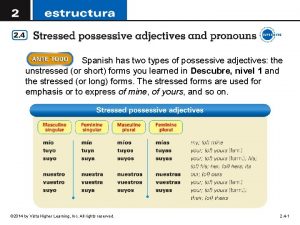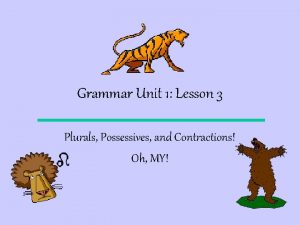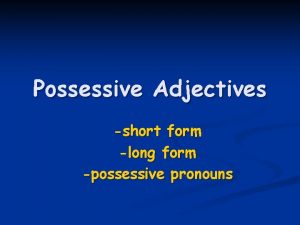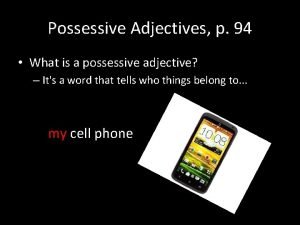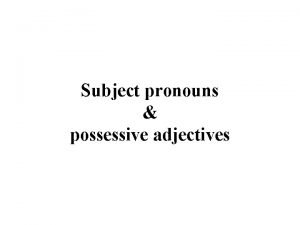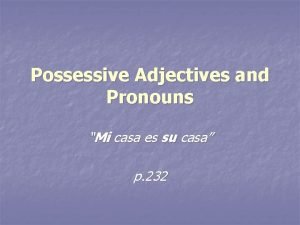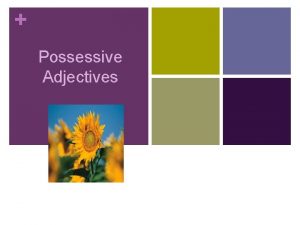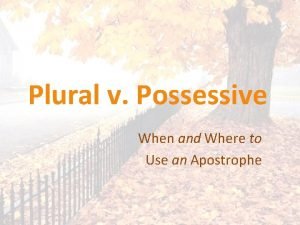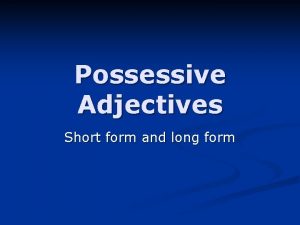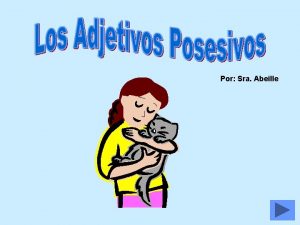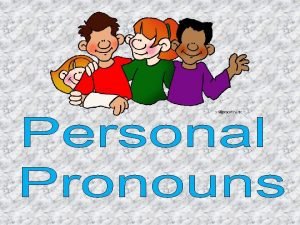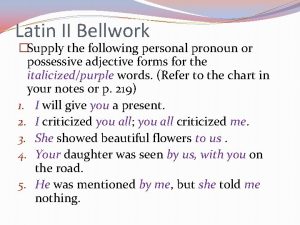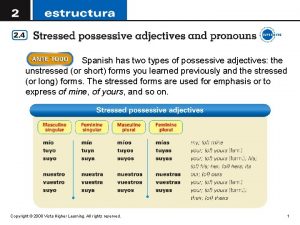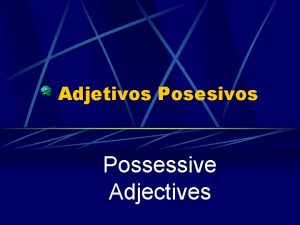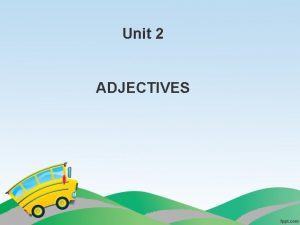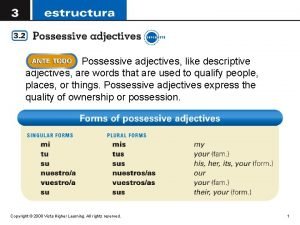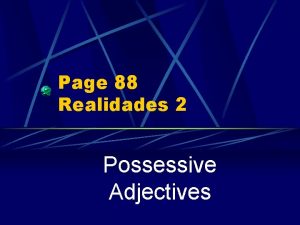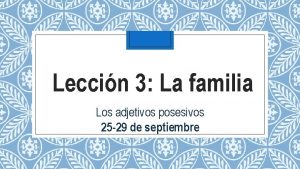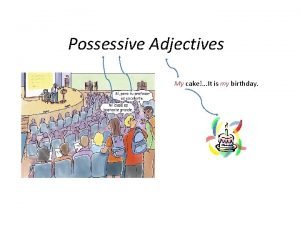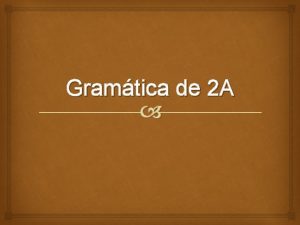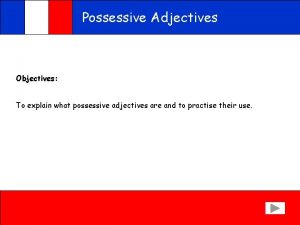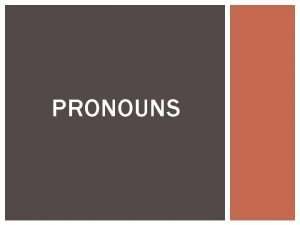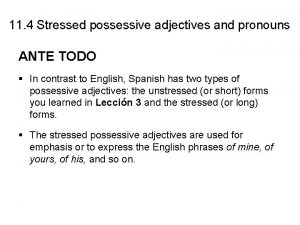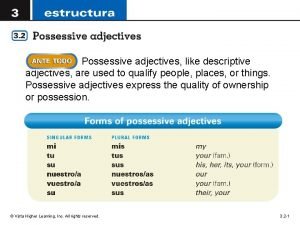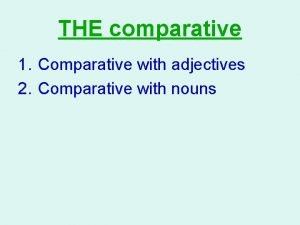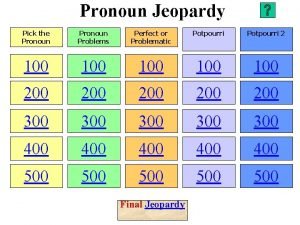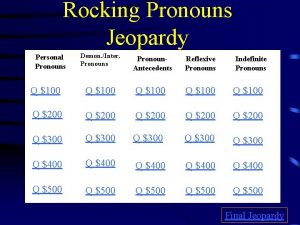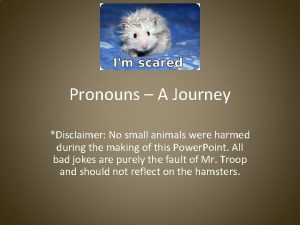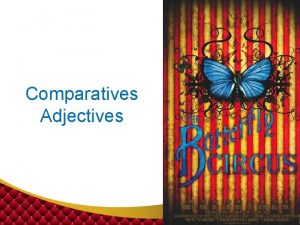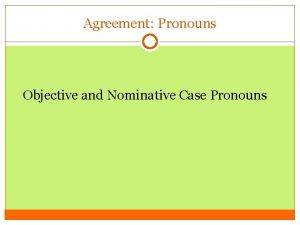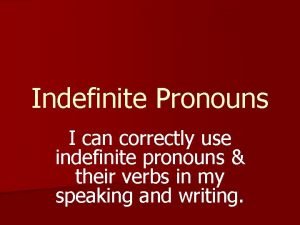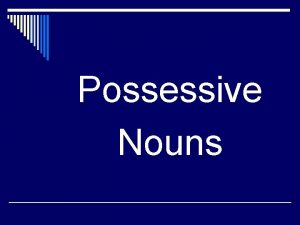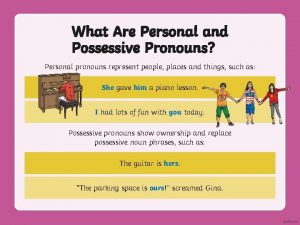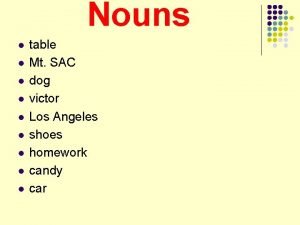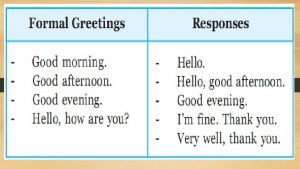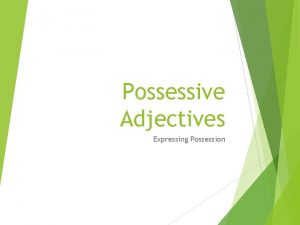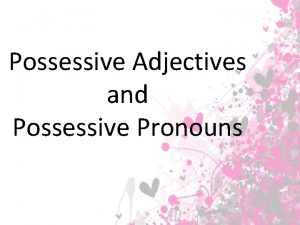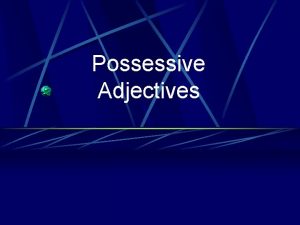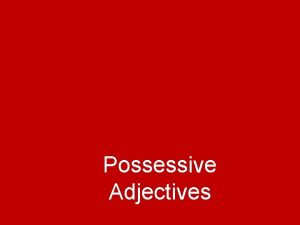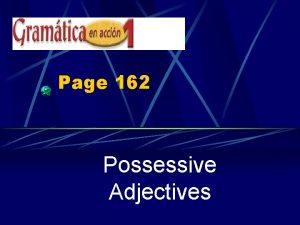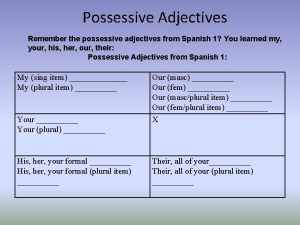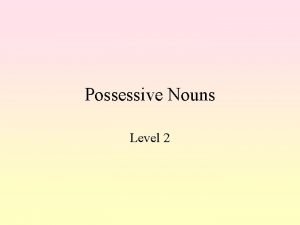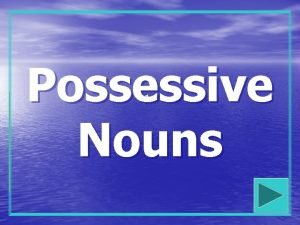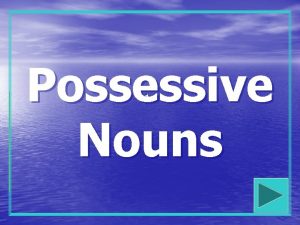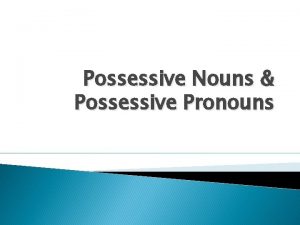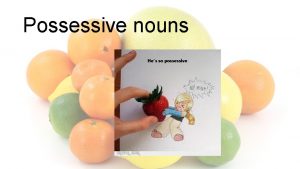Possessive Adjectives p 94 What is a possessive


























































- Slides: 58

Possessive Adjectives, p. 94 • What is a possessive adjective? – It's a word that tells who things belong to. . . my cell phone

All of these are possessive adjectives. • • my brother his father our mother your sister

How do we say "my" in French? • There are three ways to say it. . . • mon • ma • mes

Les Adjectifs Possessifs je mon ma (my) mes tu ton ta tes (your) son sa ses (his / her) il/elle/on

• For feminine nouns which begin with a vowel, use the possessive adjective: • MON NOT MA • TON • SON NOT TA SA Modèle: Voilà mon amie.

• mon, ma and mes are possessive adjectives too. • they all mean ‘my’ in English.

• mon is used in front of masculine nouns mon père / mon frère • ma is used in front of feminine nouns ma mère / ma sœur • mes is used in front of plural nouns mes parents / mes chats

Possessive adjectives must match the nouns they describe, not the owner. 1. 2. 3. 4. 5. 6. 7. 8. To figure out how to say my book: un livre Your choices are mon, ma, mes Is the noun singular or plural? Singular. Your choices are ma or mon. Is the noun feminine or masculine? The noun is masculine, so you use… mon livre. Does it matter if the owner of this book is a girl No! The adjective matches the noun, not the owner.

mon, ma ou mes?

• Complète les blancs avec mon, ma ou mes: mon cousin _____

• Complète les blancs avec mon, ma ou mes: ma tante ____

• Complète les blancs avec mon, ma ou mes: mes ____ grands-parents

• Complète les blancs avec mon, ma ou mes: mon ____ oncle

• Complète les blancs avec mon, ma ou mes: mon ____ beau-père

• Complète les blancs avec mon, ma ou mes: mes ____ poissons

• Complète les blancs avec mon, ma ou mes: ma cousine ____

• Complète les blancs avec mon, ma ou mes: ma famille ____

• Complète les blancs avec mon, ma ou mes: mon ___ ami

Complète les blancs avec mon, ma ou mes: my friend _____mon amie

Complète les blancs avec mon, ma ou mes: Reminder, all plurals have the same possessive adjective, regardless of whether they start with a vowel. . . mes amis ____

Complète les blancs avec mon, ma ou mes: Reminder, all plurals have the same possessive adjective, regardless of whether they start with a vowel. . . mes amies ____

Complète les blancs avec mon, ma ou mes: ma _____ grande sœur ma _____ cousine mon oncle _____ mon _____ anniversaire mes amis _____ ma _____ famille mon demi-frère _____

• ton, ta and tes are possessive adjectives too. • they all mean ‘your’ in English.

• ton is used in front of masculine nouns Comment s’appelle ton père? • ta is used in front of feminine nouns Comment s’appelle ta mère? • tes is used in front of plural nouns Comment s’appellent tes parents?

Possessive adjectives must match the nouns they describe, not the owner. 1. 2. 3. 4. 5. 6. 7. 8. To figure out how to say your pencil: le crayon Your choices are ton, ta, tes Is the noun singular or plural? Singular. Your choices are ta or ton. Is the noun feminine or masculine? The noun is masculine, so you use… ton crayon Will ton change if the owner of this pencil is a girl? No! Remember, the adjective matches the noun that follows, not the owner.

ton, ta ou tes?

• Complète les blancs avec ton, ta ou tes: tes soeurs _____

• Complète les blancs avec ton, ta ou tes: ton grand-père ____

• Complète les blancs avec ton, ta ou tes: ta soeur ____

• Complète les blancs avec ton, ta ou tes: ton frère _____

• Complète les blancs avec ton, ta ou tes: tes chiens ______

• son, sa and ses are possessive adjectives too. • they all mean ‘his or her’ in English.

• son is used in front of masculine nouns eg: Sophie danse avec son père. • sa is used in front of feminine nouns eg: Marc danse avec sa mère. • ses is used in front of plural nouns eg: Nicolas danse avec ses parents.

Remember: son - his /her sa - his /her ses - his /her

Possessive adjectives must match the nouns they describe, not the owner. 1. 2. 3. 4. 5. 6. 7. To figure out how to say his sister: la soeur Your choices are son, sa, ses Is the noun singular or plural? Singular. Your choices are sa or son. Is the noun feminine or masculine? The noun is feminine, so you use… sa soeur Remember, the adjective matches the noun, not the owner.

son, sa ou ses?

his brother/her brother son frère • ______

his sister/her sister sa soeur • _____

his brothers/her brothers ses • ______frères

his sisters/her sisters ses soeurs • _____

his = son, sa, ses her = son, sa ses son chien. (It's her dog. ) C'est ____ son C'est _____chien. (It's his dog. )

• Complète les blancs avec son, sa ou ses: ses soeurs _____

• Complète les blancs avec son, sa ou ses: son grand-père ____

• Complète les blancs avec son, sa ou ses: son grand-père ____

• Complète les blancs avec son, sa ou ses: ses _____chiens

• Complète les blancs avec son, sa ou ses: son frère ____

• Complète les blancs avec son, sa ou ses: son ____ frère

Une petite activité!

It’s your guitar. C’est mon tes ta ___ ta ton guitare (f). ses ma sa son mes

It’s her friend. son amie. C’est ___ mon tes ta ton ses ma sa son mes

It’s her pen son stylo. C’est ___ mon tes ta ton ses ma sa son mes

They’re your books. tes livres. Ce sont ___ mon tes ta ton ses ma sa son mes

It’s your workbook ton cahier. C’est ___ mon tes ta ton ses ma sa son mes

It’s his calculator sa calculatrice C’est ___ mon tes ta ton ses ma sa son mes

It’s my car. ma C’est ___voiture. mon tes ta ton ses ma sa son mes

Les Adjectifs Possessifs je mon ma (my) mes tu ton ta tes (your) son sa ses (his / her) il/elle/on

Une activité orale Utilisez les adjectifs possessifs son, sa, ou ses et dites qui invite qui à la fête. Michel/la copine Michel invite sa copine. 1. André/ la cousine 2. Jean-Claude/ la sœur 3. Marie-Noelle/ les frères 4. Pascal/ l’amie Sophie 5. Monique/les cousins 6. Nathalie/ l’ami Marc 7. Georges/ l’amie Cécile 8. Paul/ l’amie Thérèse

 Stressed possessive adjectives and pronouns
Stressed possessive adjectives and pronouns Subject pronouns
Subject pronouns Meaning of possessive adjectives
Meaning of possessive adjectives Descriptive and possessive adjectives
Descriptive and possessive adjectives We use possessive adjectives for parts of the body
We use possessive adjectives for parts of the body Unstressed possessive adjectives in spanish
Unstressed possessive adjectives in spanish Adjectives with p
Adjectives with p Housewife adjectives
Housewife adjectives Possessive casa
Possessive casa Reglas de possessive adjectives
Reglas de possessive adjectives Interrogative and relative pronouns
Interrogative and relative pronouns Possessive adjectives
Possessive adjectives Possessive pronouns i
Possessive pronouns i Describe doraemon using adjectives
Describe doraemon using adjectives Passenger plural possessive
Passenger plural possessive Possessive short form
Possessive short form Descriptive and possessive adjectives
Descriptive and possessive adjectives Meaning
Meaning Possessive adjectives grammarly
Possessive adjectives grammarly Plural of she
Plural of she Erimus latin
Erimus latin Possessive case
Possessive case Stressed possessive adjectives in spanish
Stressed possessive adjectives in spanish Spanish posessive pronouns
Spanish posessive pronouns Adjectives
Adjectives The possessive adjectives modify nouns.
The possessive adjectives modify nouns. Demon adjective
Demon adjective Capitulo 2a possessive adjectives p.88
Capitulo 2a possessive adjectives p.88 Possessive adjectives
Possessive adjectives Adjectives for cake
Adjectives for cake Posessive adjectives
Posessive adjectives Possessive adjectives come after a noun
Possessive adjectives come after a noun Possessive objective
Possessive objective Demonstrative and possessive pronoun
Demonstrative and possessive pronoun Unstressed pronouns
Unstressed pronouns Singular adjective
Singular adjective Mi mis tu tus su sus
Mi mis tu tus su sus Descriptive and possessive adjectives
Descriptive and possessive adjectives Possessive adjectives exemplos
Possessive adjectives exemplos Mi mis tu tus
Mi mis tu tus Subject pronoun examples
Subject pronoun examples Comparative irregular adjectives
Comparative irregular adjectives Cold strong adjective
Cold strong adjective Subject and object pronouns jeopardy
Subject and object pronouns jeopardy Using whose in adjective clauses
Using whose in adjective clauses The demon pronouns
The demon pronouns Possessive pronouns for animals
Possessive pronouns for animals Contoh pronoun reference
Contoh pronoun reference Clauses unnecessary to the meanings of the words modified
Clauses unnecessary to the meanings of the words modified Circus possessive form
Circus possessive form Nominative vs objective
Nominative vs objective Choose the correct indefinite pronouns
Choose the correct indefinite pronouns Brainpop possessive nouns
Brainpop possessive nouns Une femme possessive
Une femme possessive Personal and possessive pronoun
Personal and possessive pronoun Gerunds
Gerunds Nieces' plural or possessive
Nieces' plural or possessive Mister
Mister Possessive father
Possessive father
